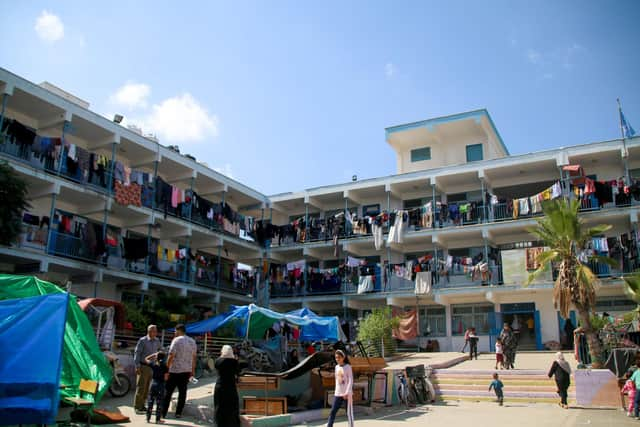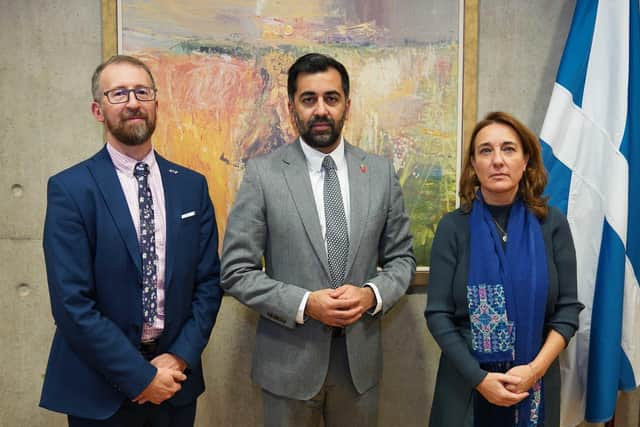Israel-Gaza war: United Nations aid agency leader praises Humza Yousaf's 'empathy' as it battles on in crisis-hit Gaza
The empathy shown by First Minister Humza Yousaf, during a quiet meeting in Edinburgh – almost 2,500 miles from the Gaza Strip – was clear.
Marta Lorenzo, the director of the representative office for Europe for United Nations agency UNWRA, had just emerged from that meeting having secured more Scottish funding for urgent humanitarian aid in Gaza.
Advertisement
Hide AdAdvertisement
Hide Ad"I saw a lot of empathy, which, in times of crisis in times of war, when you see people suffering, what you need is compassion and empathy,” she says of Mr Yousaf. The First Minister’s parents-in-law were, at the time of their meeting, still trapped in Gaza.


Ms Lorenzo adds: "I think it's important to speak the humanitarian language and not politics.”
Mr Yousaf’s family have since been allowed to leave via the Rafah border into Egypt, which began letting the first foreign passport holders across for the first time earlier this week.
"He [Mr Yousaf] has first-hand information on what is happening in Gaza,” she says. “Scotland in particular has been supportive, they understand what is happening on the ground. It has been very encouraging.”
On Thursday, the Scottish Government pledged a further £250,000 to UNRWA’s flash appeal, taking the total funding from Scotland to £750,000.


Ms Lorenzo admits UNRWA, which was set up 74 years ago to provide relief to all refugees resulting from the 1948 Palestine War, was not prepared for a crisis of the scale witnessed in Gaza over the past month.
More than 8,720 people have been killed and 22,000 injured, according to the Gazan Health Ministry, while 1.4 million people are estimated to have been displaced from their homes. UNWRA has reported some hospitals have already had to shut down, while sewage is flowing in the streets and children are being forced to drink dirty water, causing diarrhoeal illnesses. Shelters are also reporting outbreaks of respiratory diseases and chicken pox.
The organisation has 690,000 displaced people in its shelters in Gaza. Even emergency planning in case of an escalation of conflict with Egypt had not forecast that more than 150,000 people would need to be housed.
Advertisement
Hide AdAdvertisement
Hide Ad“Crises in Gaza do not catch us by surprise because we have many,” Ms Lorenzo adds. “But this one is unprecedented in in the sense of the scale, the speed and I would also say the way the crisis is unfolding. We have never seen a siege on basic supplies like electricity or water.”
Ms Lorenzo says her staff, of which 5,000 out of 13,000 are still working throughout the constant bombardment from Israel in response to the October 7 attacks by Hamas, have impossible decisions to make on a daily basis.
UNWRA has had to ration fuel since the crisis began as the 45 aid trucks carrying 180,000 litres of fuel, which used to cross into Gaza every day, were halted under Israeli sanctions. No fuel has entered the Gaza Strip since the crisis began.
"This has a lot of implications on us, as humanitarians – it is very frustrating,” she says.
"[We have to decide] ‘do I provide fuel to the bakeries to continue functioning, or do I use this fuel to purify water, or do I use it for medical assistance? Is it food that matters, or water that matters or life that matters?’ This is a very difficult choice for our colleagues in Gaza.”
Before the latest crisis, more than 500 aid trucks a day were entering Gaza, where around 80 per cent of the population relied on humanitarian aid. "Now it's everybody,” Ms Lorenzo says.
The agency, the main actor for the reception and storage of aid in the Gaza Strip, warned last weekend that civil order was “starting to break down” in Gaza, as thousands of desperate citizens broke into aid warehouses to access basic survival items. A week on, life is even harder.
Ms Lorenzo says: "You have already seen it – last weekend when people broke into our warehouses. Unfortunately, you will see things getting worse with people more in despair and suffering, people who are starving, not knowing what to do. What I can tell you is that we are running out of time and if we wait much longer to do what needs to be done, more people are going to die.”
Advertisement
Hide AdAdvertisement
Hide AdJust 64 of UNRWA’s facilities – many of them previously operating as schools – were already prepared as emergency shelters, with extra toilets, blankets and mattresses held in reserve in case of a refugee crisis. Now, they are all overflowing with people.
Ms Lorenzo points to one shelter, the Khan Younis Vocational Training Centre in southern Gaza, where a school that usually teaches 1,500 students is now home to 22,000 displaced people.
The lack of basic facilities available to accommodate the unprecedented number of people in need means that some have to queue for up to four hours to use the toilet.
“People queue for everything – they queue to go to the toilet, they queue to get food, to get bread,” she says. “They queue to get water and medical assistance, as we have to prioritise cases.
"What is sad is that children who were going to these schools, they are there in the same schools – but as shelters, sharing the classroom with 70 other people. One day children were in school, and the following day, they woke up in a shelter.
“We took pride in the work that we were doing and the quality of education that we were providing for refugees. We have been investing in the quality of the services that UNRWA was providing and in one week – or one day or a few hours – this was gone.”
She fears many Gazans mistakenly regard a UN facility as a safe haven, protected from attacks. Despite providing the Israeli military with GPS co-ordinates of their facilities, five UNRWA buildings have already been directly hit in attacks, resulting in many deaths and injuries.
More than 70 UNRWA staff members have died in the conflict so far – some of them killed alongside their entire families.
Advertisement
Hide AdAdvertisement
Hide Ad“UNRWA has existed for almost 75 years, and many of these people have been with us for 20 or 30 years,” says Ms Lorenzo.
“They have given their whole life. Even in these circumstances we see that they are displaced and they still come to do heroic work and then they are killed. The numbers keep on increasing by the day.
"UN facilities need to be protected; humanitarian workers need to be protected – they cannot be the collateral damage. When people see the UN flag, they think it’s safe – but it's not and that goes for both north and south.”
In the north of Gaza, where Israel gave an order to evacuate on October 13, warning there would be widespread attacks on the region in a bid to target Hamas infrastructure, UNRWA knows there are still 160,000 people sheltering in its facilities. However, it has been unable to contact anyone there due to a communications blackout, or provide any form of aid.
"What we need is a humanitarian ceasefire, so that we have humanitarian corridors and can move with sufficient safety and security to be able to reach this place,” Ms Lorenzo says. “And we also call for humanitarian assistance to be available everywhere in all circumstances and at all times, for people in the north, the middle and the south [of Gaza].”
Historically, aid trucks going into Gaza need to be screened by Israel – something that has not changed during the latest crisis.
However, Israeli border crossing points have been blocked and aid can only be allowed in via the Rafah crossing in Egypt, causing huge delays. Just 50 trucks a day are making it into Gaza – a drop in the ocean of the amount of aid needed.
“The simplest way to do it would be that we use existing crossing points [from Israel], but this is not being discussed right now,” Ms Lorenzo says.
Advertisement
Hide AdAdvertisement
Hide AdUNRWA was established in 1949 by the UN General Assembly to provide support, education and aid to those living in refugee communities in Jordan, Lebanon, Syria, the Gaza Strip and the West Bank. Ms Lorenzo says her staff are in Gaza to stay.
“We know that the sentiment of all our staff is that we will not leave Gaza and we will not leave the people in Gaza,” she says.
However, she knows that resuming any kind of normal life once the conflict comes to an end will not be easy. Some refugees still do not have a permanent home after their houses were destroyed in the 2014 war.
"We are in 2023 and people who lost their homes in 2014 do not have a shelter,” says Ms Lorenzo. “That shows it has been insufficient throughout.”
In Gaza, where the median age is 18, education provided by UNRWA’s network of schools has, historically, been key to a hopeful future. Ms Lorenzo fears that the destruction caused by the intense bombardment could make it difficult to quickly evacuate shelters and turn them back into schools.
“It is very difficult to imagine it now, with all this intensified violence, but we need to bring back hope to these communities,” she says. “This is going to be the next generation and we cannot fail them.”
Comments
Want to join the conversation? Please or to comment on this article.
